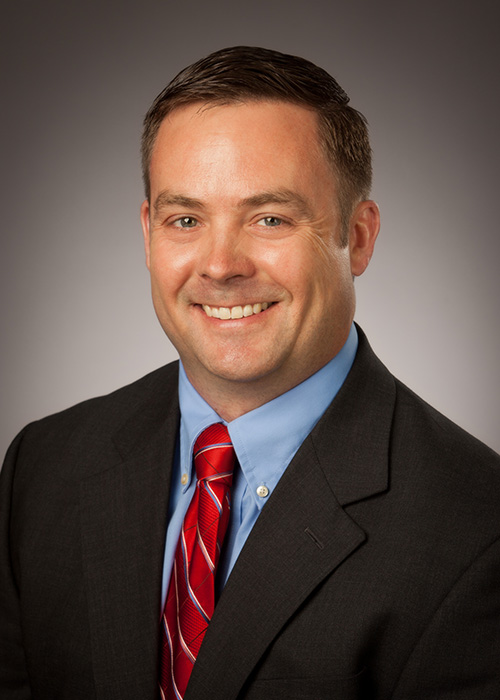Hybrid and Online Learning: Creating a Blended Experience for Digital and Physical Educational Spaces
The TTUHSC School of Health Professions is actively meeting the needs of students.

September 15 is National Online Learning Day
When the COVID-19 pandemic hit, there was a scramble for educational institutions to adapt and continue to provide services to students and staff. While online learning has been utilized for years, the pandemic forced many to quickly adopt online teaching for the first time.
September 15 is set aside as National Online Learning Day to raise awareness of the benefits and challenges of teaching and learning online.
We spoke with Wade Redman, Ph.D., about the benefits and challenges of online learning, and how to improve outcomes for the future. Redman is Chair of the Department of Laboratory Sciences and Primary Care and Associate Dean of online learning for the TTUHSC School of Health Professions.
Meeting Students’ Needs

Wade Redman, Ph.D.
“COVID changed a lot of things when we had to shift to remote learning,” Redman begins. “Many professors understood the quality and effort it takes to move things online, while some may have underestimated the task at hand.”
What’s become clear is that students respond to both face-to-face and remote learning.
“Students crave interaction more than they ever have in the past,” Redman says. “We as faculty need to create spaces to allow that more than ever.”
Redman believes that educational institutions must embrace the technology available and the many platforms that it can offer. Faculty and staff are able to work remotely and students expect that same flexibility.
“Students are our ultimate customer, and we are here to help them,” he says. “We as faculty need to embrace development opportunities to create content that is accessible in a hybrid (in-person and online) environment.”
Students prefer a method that helps track their progress so that they have a clear understanding of how they are doing. Many e-learning platforms make this possible in order to help keep them engaged.
Such platforms incorporate “AI (artificial intelligence), which can help students know where they are in a particular course,” Redman says. “This helps them to make sure they’re on top of things and not falling behind.”
The Future is Hybrid
As we learn how to live with COVID, the model of education and work will continue to evolve into a hybrid of in-person and online.
“The hybrid model is the future,” Redman says. “There are certain programmatic challenges that need to be ironed out, but it’s important be open to creating more of a hybrid nature so that students can learn where they want to learn.”
Redman stresses the importance of professors truly learning the technology used in online education in order to properly assess their students’ retention and make sure they’re engaged.
“When you teach face to face, you’re the so-called sage on the stage, you can see your students and more easily assess their engagement,” he says. “With remote learning, you have to prepare more to make sure they’re engaged and meeting certain benchmarks, which can be done synchronously or asynchronously.”
Redman says he is proud of the work that TTUHSC does to serve their students.
“We adapt and take our students’ needs and wants very seriously,” he says. “This includes how they are doing as a person, not just as a student. We want to make sure they’re okay. Their psychological needs need to be met as well as their educational needs.”
TTUHSC School of Health Professions Online Programs: Meeting and Exceeding Expectations
The online programs of the TTUHSC School of Health Professions continue to rank in the top tier of programs across the country:
- The M.S in Clinical Rehabilitation Counseling was ranked #3 in the Top 30 Most Affordable Online Master’s Degrees by TopCounseling Schools.org in 2022.
- The M.S. in Addiction Counseling was ranked #2 in the Best Online Master’s in Substance Abuse by University HQ.
- The M.S. in Healthcare Administration was ranked #7 by Best Health Degrees.
As online and hybrid learning continues to evolve, the TTUHSC School of Health Professions online programs will keep serving students where they are, providing strong engagement, education, and professional development for every student.
Related Stories
TTUHSC Receives $1 Million Gift from Amarillo National Bank to Expand and Enhance Pediatric Care in the Panhandle
TTUHSC School of Medicine leaders accepted a $1 million philanthropic gift from Amarillo National Bank on Tuesday (Feb. 10), marking a transformational investment in pediatric care for the Texas Panhandle.
Texas Tech University Health Sciences Center Permian Basin Announces Pediatric Residency Program Gift
TTUHSC Permian Basin, along with the Permian Strategic Partnership and the Scharbauer Foundation, Feb. 5 announced a gift that will fund a new pediatric residency.
The Ph.D. Programs that Shape Health Care
The Graduate School of Biomedical Sciences Ph.D. programs at TTUHSC provide the foundation, mentorship and research opportunities you need to pursue groundbreaking work.
Recent Stories
National Academy of Inventors Names TTUHSC Faculty Senior Members
The National Academy of Inventors (NAI) has designated two current and one former TTUHSC faculty researchers as Senior Members.
The John Wayne Cancer Foundation Surgical Oncology Fellowship Program at Texas Tech University Health Sciences Center Announced
TTUHSC is collaborating with the John Wayne Cancer Foundation and has established the Big Cure Endowment, which supports the university’s efforts to reduce cancer incidence and increase survivability of people in rural and underserved areas.
TTUHSC Receives $1 Million Gift from Amarillo National Bank to Expand and Enhance Pediatric Care in the Panhandle
TTUHSC School of Medicine leaders accepted a $1 million philanthropic gift from Amarillo National Bank on Tuesday (Feb. 10), marking a transformational investment in pediatric care for the Texas Panhandle.
